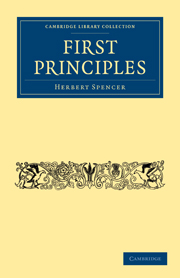III - ULTIMATE SCIENTIFIC IDEAS
Published online by Cambridge University Press: 29 August 2010
Summary
§ 15. What are Space and Time? Two hypotheses are current respecting them: the one that they are objective, and the other that they are subjective—the one that they are external to, and independent of, ourselves, the other that they are internal, and appertain to our own consciousness. Let us see what becomes of these hypotheses under analysis.
To say that Space and Time exist objectively, is to say that they are entities. The assertion that they are non-entities is self-destructive: non-entities are non-existences; and to allege that non-existences exist objectively, is a contradiction in terms. Moreover, to deny that Space and Time are things, and so by implication to call them nothings, involves the absurdity that there are two kinds of nothing. Neither can they be regarded as attributes of some entity; seeing, not only that it is impossible really to conceive any entity of which they are attributes, but seeing further that we cannot think of them as disappearing, even if everything else disappeared; whereas attributes necessarily disappear along with the entities they belong to. Thus as Space and Time cannot be either non-entities, nor the attributes of entities, we have no choice but consider them as entities. But while, on the hypothesis of their objectivity, Space and Time must be classed as things, we find, on experiment, that to represent them in thought as things is impossible. To be conceived at all, a thing must be conceived as having attributes.
- Type
- Chapter
- Information
- First Principles , pp. 47 - 67Publisher: Cambridge University PressPrint publication year: 2009First published in: 1862



